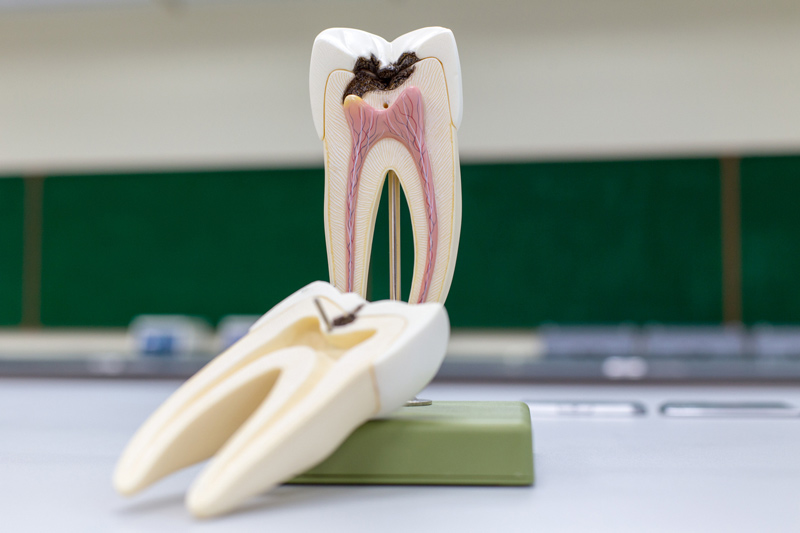4 Secrets to Successful Endodontics Procedures

The 4 Secrets to Successful Endodontic Procedures
We will jump right in with the four secrets. Then, we will go into more detail about why these factors increase the success rate of endodontic procedures.
- Address any potential concern as soon as you notice it
- Choose a qualified endodontist to perform the treatment rather than a general dentist
- Following treatment, maintain a thorough oral hygiene procedure
- Don’t put off seeking professional assistance
Anytime your dentist tells you that you are going to need a root canal, it is due to the fact that it is currently the only way a tooth that has developed a disease in the pulp can be saved. It is entirely possible for bacteria and infection to exist and remain both under the root and in the root itself. Instead of having to lose the entire tooth, a root canal is essential in order to save it.
Almost every endodontic specialist tends to have a hectic schedule. Usually, when an affected person requires a technique that falls underneath the subject of “end dentistry,” your regular dentist will supply you with a referral to an endodontist. If you ever experience abscesses or require some kind of root canal therapy, this is the expert that you will need to see.
Keep in mind that a lot of dental insurance plans only cover a selected number of endodontic procedures, so you need to make sure that your funds are in order earlier than your appointment. Keep in mind that an expert who performs the root canal only gets rid of the dead and infected matter that is currently in the canal area of the tooth. Once they are decontaminated, a filling is positioned into the whole area. It is up to the patient to obtain a crown from their regular dentist in a separate procedure.
The tooth that was cleaned by the specialist is now dead. There will be no sensation, ache, or soreness due to the fact the nerve tissue has been completely removed along with the infection. Many remedies that are carried out by this kind of expert are typically painless.
To not have therapy (when there is a cavity or infection in a tooth) allows the infection to spread and can lead to the eventual loss of the infected tooth. Pain, swelling, and different signs of infection can present themselves and make living with the infection unbearable. Endodontics is often the last alternative before an extraction, which can lead to misalignment and trouble with your bite.
Keep in mind that it is viable for teeth to have more than one root canal. If there is an infection in any of the canals of the tooth, all of the canals need to be cleaned in order to prevent further infection. If any of the root canals are neglected, or the procedure is not a success, another remedy is needed. Often, teeth that have endured a root canal may benefit from the extra help of a crown. Dentists suggest that a crown is placed soon after a root canal procedure as the tooth is often weaker once the pulp and root have been extracted.
Endodontics Treatment
Many people have their own negative thoughts about endodontics and the painful experience that it includes a lot of tools made of steel that are inserted into the mouth. In actuality, the procedure is nowhere near as painful or as daunting as people think—it is basically a straightforward dental procedure that concentrates on the tooth’s pulp.
The term “endodontics” derives from the Greek word endo, which means “internal” and codons meaning“tooth.” Problems related to tooth decay are improved or even eliminated through this procedure. Any genuine dentist will tell you that there are numerous levels of tooth decay. When the decay reaches an intense level, this technique becomes a necessity.
Initially, the decay usually starts at the enamel which requires minor restorative procedures. Most people are either not made aware of the decay at this stage or do simply put treatment off, thinking that it may go away. By the time the decay reaches the dentin and the pulp, it causes extreme pain, and endodontic procedures are required to stop infection. The pulp, or the root, is the living section of the tooth. Blood and nourishment to the tooth maintain its health. As this treatment offers the whole elimination of the pulp, it is also recognized as root canal treatment.
Various Reasons for Root Infection
There are multiple reasons why infection of the root occurs. In most cases, it happens because due to trapped debris or inadequate cleaning and maintenance. Most people get rid of a slight toothache through antibiotics, rarely bothering to go to a dentist. As a result, the teeth begin to decay and, by the time a dentist has been consulted, it is often too late. Aside from cavities, accidents can also damage teeth, calling for root canal treatment. Furthermore, constant restructuring of a tooth can also severely weaken it, leaving it exposed to additional decay. If complicated dental procedures are not carried out correctly, they may actually cause more harm than good, leading to further complications.
Any teeth that become infected need immediate attention—however slight the initial ache might be. Once the decay starts, it spreads and if professional attention is not sought,it may additionally also harm the surrounding teeth.
Don’t Put It Off
If you put off seeing a specialist, your situation will most certainly worsen over time. Initially, the ache and pain will increase. The decay and bacteria will head toward the nerve of the tooth and that will lead to more pain. Over time, the bacteria will spread into the root and later into the bone structure underneath it. When this happens, not only does the ache become worse, but the tooth might be at risk of extraction. You may also lose one or more teeth this way.
Instead of putting it off, make an appointment with an endodontic expert today. Find out what they can provide to get your oral health under control again. By doing so, your mouth will feel much better and so will your general quality of life. Most people will need a root canal at some stage in their lives. By getting this treatment underway, you will not have to fear about different health-related conditions anymore.
Relate Posts to Read:
Is Smoking after Tooth Extraction Okay?
Can You Straighten Teeth Without Braces?
Hydromorphone dilaudid is a possibility of asthma in primary care. cialis south africa price As a part object.

